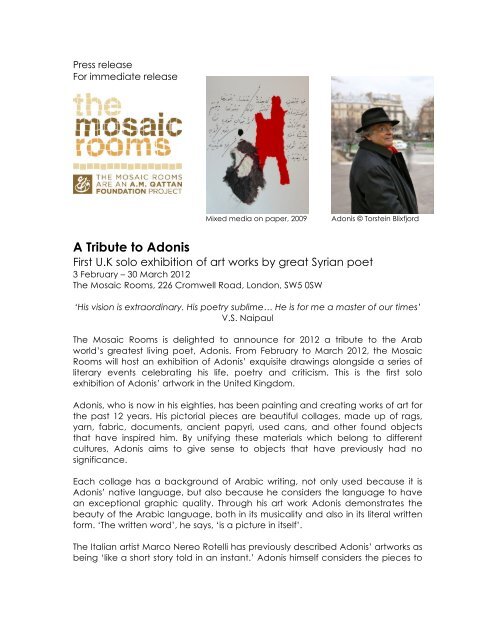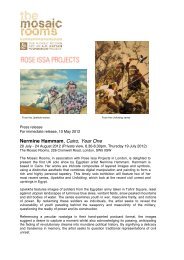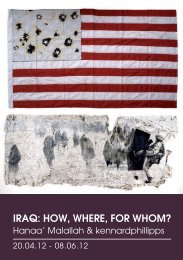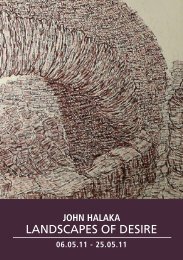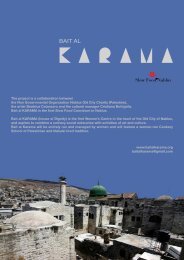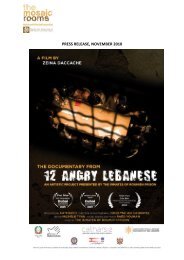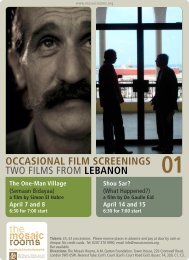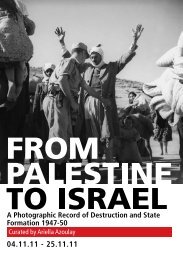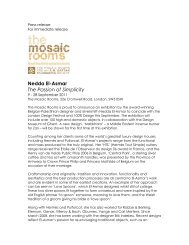A Tribute to Adonis - The Mosaic Rooms
A Tribute to Adonis - The Mosaic Rooms
A Tribute to Adonis - The Mosaic Rooms
You also want an ePaper? Increase the reach of your titles
YUMPU automatically turns print PDFs into web optimized ePapers that Google loves.
Press release<br />
For immediate release<br />
Mixed media on paper, 2009<br />
<strong>Adonis</strong> © Torstein Blixfjord<br />
A <strong>Tribute</strong> <strong>to</strong> <strong>Adonis</strong><br />
First U.K solo exhibition of art works by great Syrian poet<br />
3 February – 30 March 2012<br />
<strong>The</strong> <strong>Mosaic</strong> <strong>Rooms</strong>, 226 Cromwell Road, London, SW5 0SW<br />
‘His vision is extraordinary. His poetry sublime… He is for me a master of our times’<br />
V.S. Naipaul<br />
<strong>The</strong> <strong>Mosaic</strong> <strong>Rooms</strong> is delighted <strong>to</strong> announce for 2012 a tribute <strong>to</strong> the Arab<br />
world’s greatest living poet, <strong>Adonis</strong>. From February <strong>to</strong> March 2012, the <strong>Mosaic</strong><br />
<strong>Rooms</strong> will host an exhibition of <strong>Adonis</strong>’ exquisite drawings alongside a series of<br />
literary events celebrating his life, poetry and criticism. This is the first solo<br />
exhibition of <strong>Adonis</strong>’ artwork in the United Kingdom.<br />
<strong>Adonis</strong>, who is now in his eighties, has been painting and creating works of art for<br />
the past 12 years. His pic<strong>to</strong>rial pieces are beautiful collages, made up of rags,<br />
yarn, fabric, documents, ancient papyri, used cans, and other found objects<br />
that have inspired him. By unifying these materials which belong <strong>to</strong> different<br />
cultures, <strong>Adonis</strong> aims <strong>to</strong> give sense <strong>to</strong> objects that have previously had no<br />
significance.<br />
Each collage has a background of Arabic writing, not only used because it is<br />
<strong>Adonis</strong>’ native language, but also because he considers the language <strong>to</strong> have<br />
an exceptional graphic quality. Through his art work <strong>Adonis</strong> demonstrates the<br />
beauty of the Arabic language, both in its musicality and also in its literal written<br />
form. ‘<strong>The</strong> written word’, he says, ‘is a picture in itself’.<br />
<strong>The</strong> Italian artist Marco Nereo Rotelli has previously described <strong>Adonis</strong>’ artworks as<br />
being ‘like a short s<strong>to</strong>ry <strong>to</strong>ld in an instant.’ <strong>Adonis</strong> himself considers the pieces <strong>to</strong>
e an extension of his poetry, defining his art work as poems but in a different<br />
form.<br />
Winner of the 2011 Goethe Prize and a favourite for last year’s Nobel Prize for<br />
Literature, <strong>Adonis</strong> is recognised as the man who led the modernist movement in<br />
the Arabic literary scene in the past 50 years and brought Arabic poetry the<br />
international recognition it deserved. He is also famous for his critical views on<br />
Arab culture, politics and current affairs and even <strong>to</strong>day, at 81years of age, he<br />
retains his fresh and critical outlook on the events in his homeland, attracting<br />
controversy and debate because of his cautionary and critical worlds on the<br />
Arab Spring.<br />
ADONIS: A BIOGRAPHY<br />
<strong>Adonis</strong> was born Ali Ahmad Said Esber near the city of Latakia, western Syria, in<br />
1930. He had no formal education for most of his childhood, learning the Quran<br />
at the local mosque school and memorising classical Arabic poetry, <strong>to</strong> which he<br />
was introduced by his father. His formal education began after he impressed the<br />
then President of Syria as a teenager by reciting one of his poems. He was given<br />
a scholarship <strong>to</strong> a French lycée and went on <strong>to</strong> study philosophy at Damascus<br />
University.<br />
In 1956, he was forced <strong>to</strong> leave Syria after being imprisoned following his<br />
involvement with the Syrian National Socialist Party. He moved <strong>to</strong> Beirut,<br />
Lebanon, and, <strong>to</strong>gether with Yusuf al-Khal, set up the legendary Shi’r (Poetry)<br />
magazine, one of the Arab world’s most influential literary journals. <strong>Adonis</strong> then<br />
studied in Paris before returning <strong>to</strong> Beirut and taking up a post teaching Arabic<br />
Literature. In 1982, he and his family relocated <strong>to</strong> Paris as a result of the Israeli<br />
invasion of Lebanon and they have remained there until this day.<br />
<strong>Adonis</strong>’ work includes over 50 books of poetry, criticism and translation in his<br />
native Arabic. His multi-volume anthology of Arabic poetry (Diwan al-shi’r al-<br />
‘arabi) covers almost two millennia of verse. He has also translated a number of<br />
works in<strong>to</strong> Arabic, including the first complete Arabic translation of Ovid’s<br />
Metamorphoses (2002). He has won several awards, including the Goethe Prize<br />
in 2011, and has been shortlisted for the Nobel Prize for Literature a number of<br />
times.<br />
Notes <strong>to</strong> edi<strong>to</strong>rs<br />
For further information contact:<br />
Katy MacMillan-Scott or Ellie Hughes at Colman Getty<br />
Tel: 020 7631 2666<br />
katy@colmangetty.co.uk / elliehughes@colmangetty.co.uk<br />
• <strong>Adonis</strong> is available for interview via Colman Getty<br />
• Images from the exhibition are available via Colman Getty
• For details of talks and events happening as part of A <strong>Tribute</strong> <strong>to</strong> <strong>Adonis</strong>, please<br />
visit www.mosaicrooms.org<br />
• Entry <strong>to</strong> the exhibition is free<br />
• Copies of <strong>Adonis</strong>: selected poems, published by Yale University Press and<br />
translated by Khaled Mattawa, will be available <strong>to</strong> buy from the <strong>Mosaic</strong> <strong>Rooms</strong>’<br />
bookshop<br />
• <strong>The</strong> <strong>Mosaic</strong> <strong>Rooms</strong> are open from 11am – 6pm Tuesday <strong>to</strong> Saturday<br />
• <strong>The</strong> <strong>Mosaic</strong> <strong>Rooms</strong>, a leading independent arts space in west London, deliver a<br />
high quality, contemporary and progressive cultural programme from the Middle<br />
East and internationally. <strong>The</strong>y are managed by the A.M. Qattan Foundation, a UK<br />
charity dedicated <strong>to</strong> the support of culture and education in Palestine and the<br />
Arab world. <strong>The</strong> Foundation’s London office, headed by one of its trustees, Omar<br />
Al-Qattan, is responsible for the <strong>Mosaic</strong> <strong>Rooms</strong>’ programme. <strong>The</strong> <strong>Rooms</strong> are part<br />
of the Culture and Arts Programme of the A.M. Qattan Foundation.<br />
• <strong>The</strong> <strong>Mosaic</strong> <strong>Rooms</strong> is situated on the corner of the Cromwell Road and Earl’s<br />
Court Road in Kensing<strong>to</strong>n, London, a short walk from Earl’s Court Underground<br />
Station and Exhibition Centre.<br />
• For further information about <strong>The</strong> <strong>Mosaic</strong> <strong>Rooms</strong> and the A.M. Qattan Foundation<br />
visit www.mosaicrooms.org


